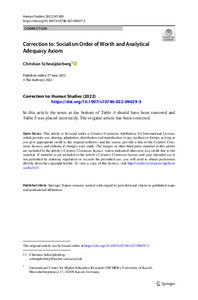| dc.date.accessioned | 2022-09-07T13:54:09Z | |
| dc.date.available | 2022-09-07T13:54:09Z | |
| dc.date.issued | 2022-06-15 | |
| dc.identifier | doi:10.17170/kobra-202207126459 | |
| dc.identifier.uri | http://hdl.handle.net/123456789/14134 | |
| dc.description.sponsorship | Gefördert im Rahmen des Projekts DEAL | ger |
| dc.language.iso | eng | eng |
| dc.rights | Namensnennung 4.0 International | * |
| dc.rights.uri | http://creativecommons.org/licenses/by/4.0/ | * |
| dc.subject | axiological sociology | eng |
| dc.subject | Orders of worth | eng |
| dc.subject | public and private health insurance | eng |
| dc.subject | sociology of conventions | eng |
| dc.subject | theory development | eng |
| dc.subject.ddc | 370 | |
| dc.title | Socialism Order of Worth and Analytical Adequacy Axiom | eng |
| dc.type | Aufsatz | |
| dcterms.abstract | Boltanski and Thévenot (On justification. Economies of worth, Princeton University Press, Princeton, 2006) constructed in their seminal work On Justification the Orders of Worth (OW) framework as a research program for further empirical and theoretical development. This article suggests two methodological additions to extend the analytical capacities of the OW framework: The Socialism OW and the analytical adequacy axiom. The polito-philosophical Socialism OW, which acknowledges '(collective) welfare' as its mode of evaluation (worth) and the higher principle of 'solidarity' as its test, is rooted in the political philosophy of Rosanvallon (The society of equals, Harvard University Press, Cambridge, 2013). In addition to the systematic justification of the canonical text, this article also offers a tabular presentation for the construction of a new OW in relation to the axioms. In the article, first, the existing OW are put under scrutiny discussing the test category of solidarity, which was added and creates an analytic overload for the Civic OW. Second, analyzing the case of the German binary statutory health system, comprising of a private (first-class) and a public (second-class) healthcare, the capacities of the existing OW are discussed to identify a blank spot in the OW framework for empirical analysis. Accordingly, the descriptive analysis of the German binary health system is less about how the system is justified, and much more about understanding how given OW operate within it as coordinative devices. This systematic analysis of a situation of (temporary) agreements, especially of investments in forms, amends the OW use for empirical analysis of critique and justification in a situation. | eng |
| dcterms.accessRights | open access | |
| dcterms.creator | Schneijderberg, Christian | |
| dc.relation.doi | doi:10.1007/s10746-022-09629-3 | |
| dc.subject.swd | Soziologie | ger |
| dc.subject.swd | Wertphilosophie | ger |
| dc.subject.swd | Konvention | ger |
| dc.subject.swd | Private Krankenversicherung | ger |
| dc.subject.swd | Gesetzliche Krankenversicherung | ger |
| dc.subject.swd | Entwicklungstheorie | ger |
| dc.type.version | publishedVersion | |
| dcterms.source.identifier | eissn:1572-851X | |
| dcterms.source.issue | Issue 2 | |
| dcterms.source.journal | Human Studies | eng |
| dcterms.source.pageinfo | 283-308 | |
| dcterms.source.volume | Volume 45 | |
| kup.iskup | false | |



